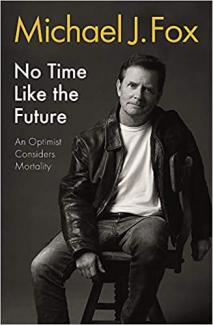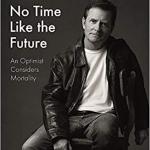
Rajeev K. Gupta, a Parkinson’s patient himself, empathises with Michael J.Fox, the movie star suffering from YOPD, and reviews the latter’s latest book, No Time like the Future, calling it real and relatable.
A book which talks of PD as it is
Michael J Fox’s latest book No Time Like the Future is a heart touching story of his struggles and triumphs with not only PD (Parkinson’s Disease), but other debilitating conditions too such as a spinal cord tumor and a broken arm
A Young Onset Parkinson’s Disease (YOPD) patient, Michael was diagnosed with PD at the age of 29 in 1991 when he was at the peak of his career as a movie star after starring in the highly successful ‘Back to the Future’ trilogy. He has described his journey from disbelief to acknowledgment, from denial to acceptance, from hiding to sharing and from resignation to fighting in his first two books Lucky Man and Always Looking Up. I read both these books right after my own PD diagnosis in 2013. I found both the books to be morale boosting and informative but not heart touching. I mean optimism is one thing, but to make a statement such as “I consider myself lucky to have got Parkinson’s.” is glorifying the disease. It was as if even after deciding to go public about his disease, Michael was still trying to hide his own vulnerabilities and anxieties behind a thin and rather transparent veil of over optimism.
In this latest book Mike himself asks, “Have I oversold optimism as a panacea, commodified hope? Have I been an honest broker with the Parkinson’s community? The understanding I’ve reached with Parkinson’s is sincere, but the expression of it risks being glib.”
Mike has opened-up and is candid about both his frustrations and hopes, his anxieties and coping mechanisms. He comes across more as a mortal human being like you and I and not a distant star who we can just aspire to emulate but cannot relate to. “My optimism is suddenly finite.”, he says at one stage. This ‘finite optimism’ is what makes this such a wonderful book.
PD, by itself, is a roller coaster journey, enough to rattle the strongest. Add a debilitating tumor in the spinal cord and you can imagine the hopelessness of the situation. Mike, supported by his loving and caring family, decides to get the tumor removed surgically despite the associated risks. The author has given detailed accounts of his recovery and rehabilitation. He has talked about his emotional and physical setbacks and how he coped without being mushy.
Mike keeps his sense of humor in tact throughout the narrative e.g. when he falls down and breaks his arm post-surgery, his wife Tracy offers to cancel her vacations and return home while Mike reassures her “Honey, it is just a broken arm.” “It is a badly broken arm.” counters Tracy. Mike replies “Well, there’s no such thing as a goodly broken arm.” You can’t help smiling at this. Talking about his dancing he says,” My dancing has never been good and my best moves are unintentional.” Smile! “We prepare our children to go off to school, and then they have the nerve to actually leave.” One more smile please.
Michael and Tracy had a son before Michael was diagnosed with PD. They decided to have more children after the diagnosis and in time, are blessed with three beautiful daughters. Summing up people’s reaction to this, he says, ”People felt strangely comfortable asking if we were concerned about bearing more children while dealing with the open-ended escalation of a major neurological disorder, and the fear that the babies could inherit the disease. The question could be construed as inappropriate, but the answer was: We weren’t concerned, nor should they be.”
PD affects people in myriad of ways, from tremors, rigidity, balance (rather the lack of it), mood disorders, sleep disorders, cognitive issues, muscle cramps, constipation etc. etc. “And people think Parkinson’s disease is all about tremor. I thought that once, too.” Even relationships are impacted. “It’s the same family, but my place within it has shifted.”
Yes “…….it’s not possible to sum up Parkinson’s in a picture or two.” Yet, it is a magnificent attempt to portray the essence. We, the Parkinsonians, can relate to this.

As you rightly said, we may not want to live like this, but we have to find a way to accept the fact that we do.
Let us face it with optimism and gratitude for what we still have and what we can still do.“With gratitude, optimism becomes sustainable.”
You have echoed my own sentiments when you say,” I want to be strong for my daughter and son. I want them to know that I’m trying my best. If they ever get into a position in life where they’re faced with some hardship, they can think, ‘What would my dad do?’”
“Disease has a way of connecting us.” Sure.
Read about Rajeev'Gupta's book: Destination Unknown: My Journey with Parkinson's






